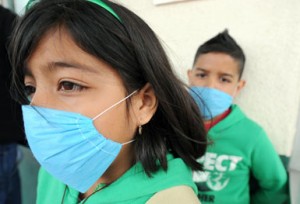With a 23-month old toddler being the first swine flu-related death in the USA, parents number one concern may be keeping their kids safe and health. But there is no need to panic, says Dr. Bob Sears, although “people should be aware of what’s going on and how to lower their risk of catching or spreading this unusual strain of the flu.”
Staying Healthy
The Centers for Disease Control and Prevention’s website is being updated on an almost daily basis, and you can read all sorts of timely and useful information about what it is, where it is, how to prevent it, and how to seek care if you suspect it. The symptoms are the same as the regular flu, and it isn’t clear why there have been more fatalities than expected in the Mexico outbreak.
Here are the CDC’s recommendations on what you can do to stay healthy:
There are everyday actions people can take to stay healthy.
- Cover your nose and mouth with a tissue when you cough or sneeze. Throw the tissue in the trash after you use it.
- Wash your hands often with soap and water, especially after you cough or sneeze. Alcohol-based hands cleaners are also effective.
- Avoid touching your eyes, nose or mouth. Germs spread that way.
- Try to stay in good general health. Get plenty of sleep, be physically active, manage your stress, drink plenty of fluids, and eat nutritious food.
- Try not touch surfaces that may be contaminated with the flu virus. Avoid close contact with people who are sick.
Try to avoid close contact with sick people.
- Influenza is thought to spread mainly person-to-person through coughing or sneezing of infected people.
- If you get sick, CDC recommends that you stay home from work or school and limit contact with others to keep from infecting them.
Are you worried?
I’m not worried in the least. The media is ridiculous. There are so many types of flu and people are sick every year. I’m sure the numbers are much higher, many people don’t go to the doctor for flu. Terribly sad about that baby 🙁 but kids die every day from RSV and other flus, etc. I’ll worry when and if I have to, but not because a handful of people in this giant state have it.
What to do if you get sick
If you live in areas where swine influenza cases have been identified and become ill with influenza-like symptoms, including fever, body aches, runny nose, sore throat, nausea, or vomiting or diarrhea, the CDC advises you to contact your health care provider, particularly if you are worried about your symptoms. Your health care provider will determine whether influenza testing or treatment is needed.
If you are sick, you should stay home and avoid contact with other people as much as possible to keep from spreading your illness to others.
If you become ill and experience any of the following warning signs, seek emergency medical care.
In children emergency warning signs that need urgent medical attention include:
- Fast breathing or trouble breathing
- Bluish skin color
- Not drinking enough fluids
- Not waking up or not interacting
- Being so irritable that the child does not want to be held
- Flu-like symptoms improve but then return with fever and worse cough
- Fever with a rash
In adults, emergency warning signs that need urgent medical attention include:
- Difficulty breathing or shortness of breath
- Pain or pressure in the chest or abdomen
- Sudden dizziness
- Confusion
- Severe or persistent vomiting





